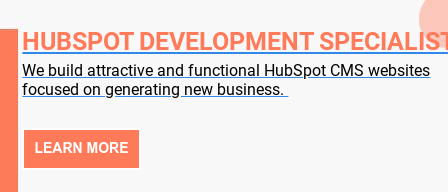Over the past two years, we’ve started securing projects where building a HubSpot website is the best solution. In fact, we're building an increasingly large percentage of our client’s websites on HubSpot CMS and HubSpot website development has become a large part of our work. This is largely because we think it’s a great system with some fantastic features. But we appreciate that you don’t want to take our word for that.

Choosing the right platform is key to ensuring your website generates new business. It’ll affect everything from how you upload and publish content to the integrations you can implement or how your website scales, so before you consider building a HubSpot website, it pays to make sure that you’re making a considered decision – informed by real-world experience. It's also worth getting help setting up and optimising HubSpot.
It's also worth doing some research if you're comparing HubSpot to WordPress for example, because free isn't always the most sensible option.
But it’s actually quite hard to find a properly impartial, nuts-and-bolts breakdown of HubSpot CMS’s pros and cons. The web’s full of thinly-veiled promotional material with a very clear agenda. But getting your hands on an in-depth and plain-English analysis of the platform’s capabilities? Apparently, that’s a tall order.
So we’ve decided to fix the problem; publishing an impartial guide for people who’re wondering whether HubSpot CMS is the right choice for their website.
This guide is written by developers who’ve been putting it through its paces for well over 24 months now, and it should serve as a great starting point for anyone who's trying to make an informed decision.
First Things First What Is HubSpot CMS?
In simple terms, a CMS (or content management system) is the software that underpins most modern websites, providing the basic infrastructure needed to upload and manage images, publish content and grow your digital footprint.
When developing a website, you generally start with a CMS, then add your own CSS files, page templates, aftermarket modules or plugins to fully customise the feel - and functionality - of the finished product.

WordPress is the most popular CMS on the market, powering approximately 43% of all websites (source: Search Engine Journal). Shopify is also popular for eCommerce, and many B2B sites are built using a CMS called Joomla, which is prized for its flexibility.
But we think that HubSpot has developed a comparable product with a couple of truly unique features that make it a shoo-in for anyone that’s looking to grow their business online. For starters, HubSpot CMS websites are designed to automatically integrate with other HubSpot products, including Sales Hub, Marketing Hub or Operations Hub Pro.
This is very handy if you use these platforms to manage your digital marketing campaign and/or monitor leads as they move through your sales pipeline. It’s also useful functionality to have on standby – should you want to start using any of these products later.
It's Not All About Native Integrations
Other - major - advantages include a drag-and-drop page builder, capable of allowing the most technophobic marketer throws up a passable landing page in a matter of minutes; an intuitive interface that makes it very easy to customise content on the fly and a suite of smart personalisation tools that are designed to help you create tailored experiences for repeat visitors.

When would this be useful? Well, imagine that you have a customer portal that long-term clients could log into whenever they wanted to look at useful resources, upload a screenshot, blueprint or specification for your team to look at or
Using HubSpot CMS, you’d be able to build a login success page that called your customers out by name; upping engagement and building a stronger relationship that encourages repeat business.
Any More Advantages To Building In HubSpot CMS?
The hosting setup is worth mentioning too: With a traditional CMS like wordpress, you have to find your own hosting, pay for someone to manage all your plugins and updates, implement your own security patches and fix any outages.
It’s a DIY option. But HubSpot CMS offers fully managed hosting by default. Every subscription (including the free one) provides this service and the price doesn’t increase based on your storage requirements, traffic levels or usage.

Better still, your site will be hosted on HubSpot’s own servers and they’ll spend their time and money making sure the lights stay on, your security is up to date etc.
It’s not the be-all and end-all by any stretch of the imagination, but this fully-managed approach does take a lot of stress out of running and maintaining a website so if you’re hunting for a worry-free solution that’s all-but guaranteed to keep your site up around the clock, HubSpot is a great choice.
While we’re on the subject of simple and straightforward, it’s also worth pointing out that building on HubSpot will often reduce future development costs too. Yes, you’ll always need the support of a good agency, but routine tasks like uploading new content, adding a video to a page or building a brand-new CTA are much (much) simpler in HubSpot, which benefits from an incredibly clean and simple UI.
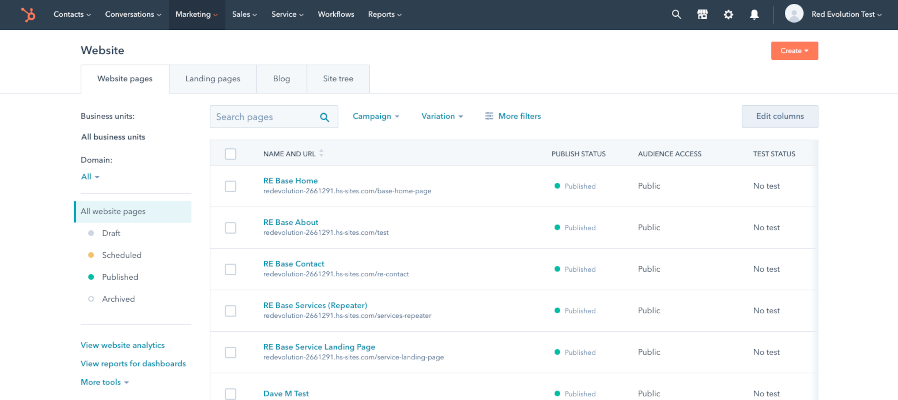
In fact, HubSpot actually comes packaged with DIY CTA builder that's specifically designed for code-phobic marketers built into the platform, and a really smart content management system that takes 99% of the hard work out of organising blog posts, landing pages and video.
Making good use of these features will cut down on the amount of dev time you need to implement relatively small tweaks to the look and functionality of your site – saving you money and time.
The Disadvantages To Building In HubSpot CMS
There are a couple, although they’re not a significant impediment for most B2B businesses. For starters, HubSpot has no built-in eCommerce functionality, which will be a problem for anyone that’s looking to sell products directly via their website.
That said, HubSpot does have a very developed marketplace for 3rd party apps and there are several plugins that add this functionality to your website so if you like the sound of building on HubSpot CMS, there’s no reason to let its lack of native eCommerce functionality put you off.
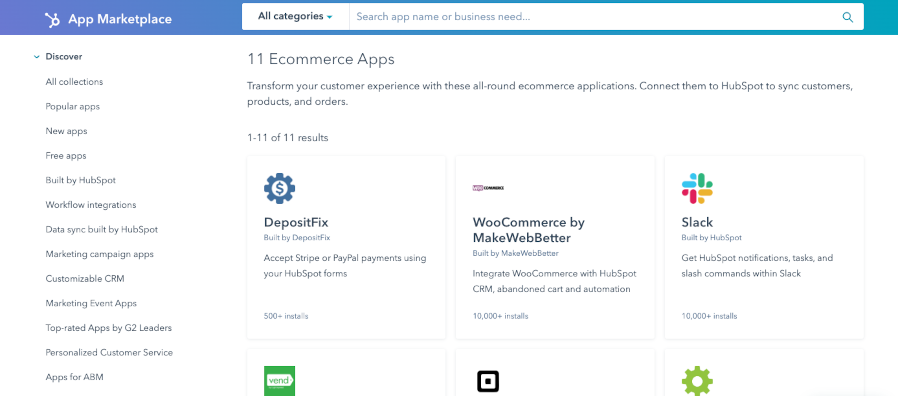
Secondly, HubSpot’s not open source, so there are some limitations to what developers can do to the underlying functionality of CMS Hub websites.
This doesn’t really apply to the front end stuff that governs the look and feel of your website, but it is relevant if, for example, you’re trying to do things like (securely) request, modify, format and display data from a third-party source without a pre-written integration.
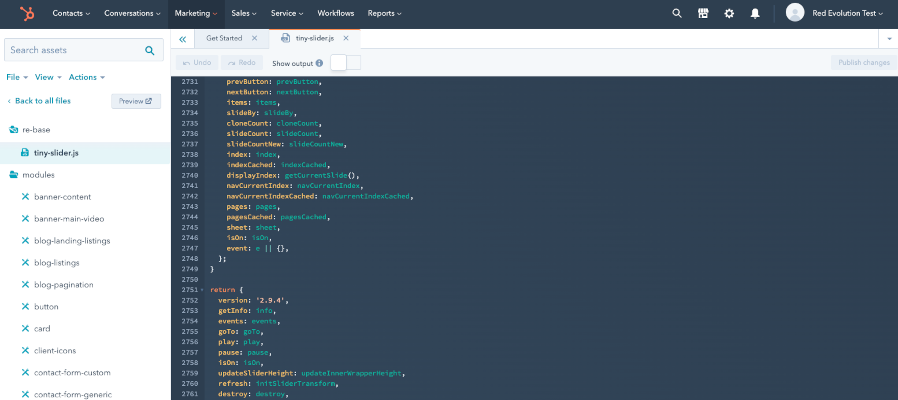
HubSpot also uses its own custom markup language called HubL, which means that you will need to work with experienced HubSpot developers when setting up your site. Vendor choice will be slightly restricted and you might end up paying slightly more per-hour for developers with the requisite skills.
But all in all, HubSpot’s straightforward and accessible, with a host of unique advantages and a very small handful of disadvantages that are easy to negate with the help of a specialist HubSpot development agency.
How Much Does It Cost To Build A Site On HubSpot?
Comparisons between HubSpot and Wordpress inevitably raise questions about cost and accessibility, so we’ll address that here.
Designing and developing a website for HubSpot CMS isn’t really any different to designing and developing a website on any other platform. It’ll take approximately the same number of man-hours as it would to build any given site on Wordpress or Joomla, although there are a couple of time-saving features like HubDB, which takes some of the grunt work out of implementing complex functionality across the site.
So the actual cost of development will be roughly the same as it would be for any other platform – give or take a few hours of your agency's time.

Subscribing to HubSpot does cost, but it’s not much. Basic CMS subscriptions start at £19 pcm and don’t go up to the next tier (£297) until you need things like custom report builders and built-in A/B testing functionality which you can (normally) achieve using 3rd party plugins.
It's also worth noting that HubSpot partner agencies may be able to negotiate slight discounts to any monthly fees on your behalf – and there is the option to bypass your subscription altogether if you don’t mind having HubSpot branding on your site. This is done by using the free version of CMS Hub, which still gets you the full managed hosting etc, but there is a limit to the number of pages you can build and you also lose access to useful functionality like the drag and drop page builder.
What's It Actually Like To Build A Website On HubSpot?
Honestly? Pretty great. It’s a straightforward platform with a real focus on ease of use, which makes it a pleasure to work with.
You might have to hunt around a bit for some of the more advanced functionality and wrestle with the (rather obtuse) image manager, but things like the template system, which allows you to create any number of completely independent templates for a given theme, more than makeup for any niggles.
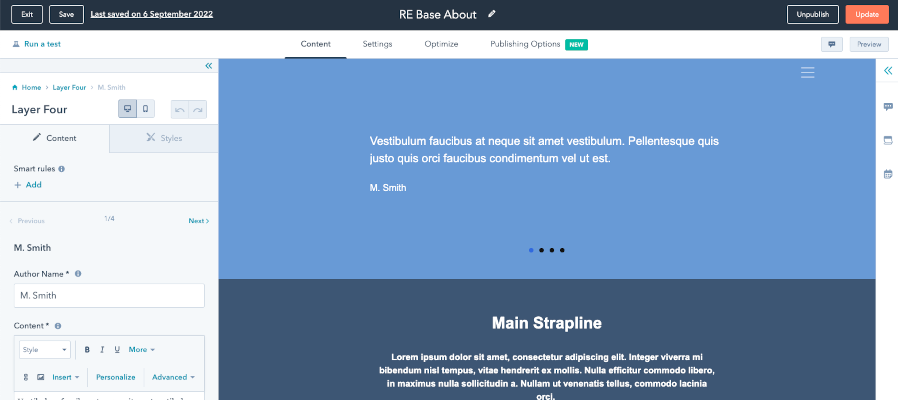
The customisation options are very strong too. For example, let’s pretend we’re developing a new template for a category page. By default, you can choose to develop a template that can be modified by your marketing team (using a drag-and-drop interface)
But if you’re worried that your marketing team might modify the template in a way that spoils the look and feel of your site, you can hardcode the template so that it can’t be modified.
Or hard code it with optional modules that can then be added or taken away by non-devs, allowing for limited customisation within specific parameters that maintain your site's overall aesthetic.

As developers, we’ll say that HubSpot allows you to choose the precise level of customisation you want different users to have, which is hugely powerful. It’s also a very scalable system with a developed marketplace for 3rd party plugins, and HubSpot itself provide a good level of tech support.
So it’s definitely up there alongside competing platforms like WordPress or Joomla, and we think it’s a great choice for many B2B businesses. We hope this has helped you understand how to create a website with Hubspot and has put the option of building a HubSpot website onto your radar.
